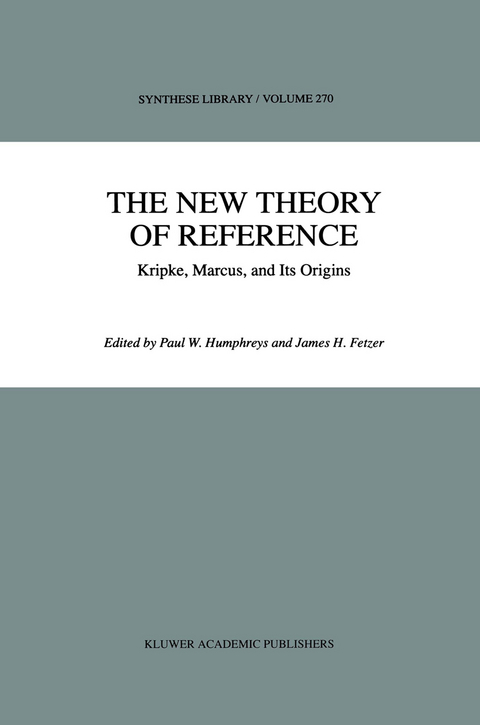
The New Theory of Reference
Kripke, Marcus, and Its Origins
Seiten
1999
|
Softcover reprint of the original 1st ed. 1998
Springer (Verlag)
978-0-7923-5578-6 (ISBN)
Springer (Verlag)
978-0-7923-5578-6 (ISBN)
Deals with the debate over the origins of the New Theory of Reference. This book discusses who was responsible for the ideas that Saul Kripke presented in his "Naming and Necessity". It also discusses the contributions of philosophers such as Follesdal, Geach, Hintikka, Plantinga, and Stig Kanger to the development of modal semantics.
On January 20th, 22nd, and 29th, 1970 Saul Kripke delivered three lectures at Princeton University. They produced something of a sensation. In the lectures he argued, amongst other things, that many names in ordinary language referred to objects directly rather than by means of associated descriptions; that causal chains from language user to language user were an important mechanism for preserving reference; that there were necessary a posteriori and contingent a priori truths; that identity relations between rigid designators were necessary; and argued, more tentatively, that materialist identity theories in the philosophy of mind were suspect. Interspersed with this was a consider able amount of material on natural kind terms and essentialism. As a result of these lectures and a related 1971 paper, 'Identity and Necessity' (Kripke [1971]), talk of rigid designators, Hesperus and Phosphorus, meter bars, gold and H 0, and suchlike quickly became commonplace in philosophical circles 2 and when the lectures were published under the title Naming and Necessity in the collection The Semantics of Natural Language (Davidson and Harman l [1972]), that volume became the biggest seller in the Reidel (later Kluwer) list. The cluster of theses surrounding the idea that a relation of direct reference 2 exists between names and their referents is now frequently referred to as 'The 3 New Theory of Reference'.
On January 20th, 22nd, and 29th, 1970 Saul Kripke delivered three lectures at Princeton University. They produced something of a sensation. In the lectures he argued, amongst other things, that many names in ordinary language referred to objects directly rather than by means of associated descriptions; that causal chains from language user to language user were an important mechanism for preserving reference; that there were necessary a posteriori and contingent a priori truths; that identity relations between rigid designators were necessary; and argued, more tentatively, that materialist identity theories in the philosophy of mind were suspect. Interspersed with this was a consider able amount of material on natural kind terms and essentialism. As a result of these lectures and a related 1971 paper, 'Identity and Necessity' (Kripke [1971]), talk of rigid designators, Hesperus and Phosphorus, meter bars, gold and H 0, and suchlike quickly became commonplace in philosophical circles 2 and when the lectures were published under the title Naming and Necessity in the collection The Semantics of Natural Language (Davidson and Harman l [1972]), that volume became the biggest seller in the Reidel (later Kluwer) list. The cluster of theses surrounding the idea that a relation of direct reference 2 exists between names and their referents is now frequently referred to as 'The 3 New Theory of Reference'.
I: The APA Exchange.- 1. Marcus, Kripke, and the Origin of the New Theory of Reference.- 2. Revisionism about Reference: A Reply to Smith.- 3. Marcus and the New Theory of Reference: A Reply to Scott Soames.- II: Replies.- 4. More Revisionism about Reference.- 5. Marcus, Kripke, and Names.- 6. How Not to Write History of Philosophy: A Case Study.- 7. Direct, Rigid Designation and A Posteriori Necessity: A History and Critique.- III: Historical Origins.- 8. Referential Opacity and Modal Logic, §§16-19.- 9. An Exposition and Development of Kanger’s Early Semantics for Modal Logic.- 10. A More Comprehensive History of the New Theory of Reference.- Name Index.
| Reihe/Serie | Synthese Library ; 270 |
|---|---|
| Zusatzinfo | XIII, 290 p. |
| Verlagsort | Dordrecht |
| Sprache | englisch |
| Maße | 155 x 235 mm |
| Themenwelt | Geisteswissenschaften ► Philosophie ► Sprachphilosophie |
| ISBN-10 | 0-7923-5578-4 / 0792355784 |
| ISBN-13 | 978-0-7923-5578-6 / 9780792355786 |
| Zustand | Neuware |
| Haben Sie eine Frage zum Produkt? |
Mehr entdecken
aus dem Bereich
aus dem Bereich
Aspekte einer Ontologie des Logos
Buch | Hardcover (2024)
Springer Fachmedien (Verlag)
119,99 €
Wie die Menschheit zu ihrer größten Erfindung kam
Buch | Softcover (2022)
C.H.Beck (Verlag)
18,00 €
Macht und Legitimität politischer Sprache im Prozess der europäischen …
Buch | Softcover (2023)
Nomos (Verlag)
74,00 €


